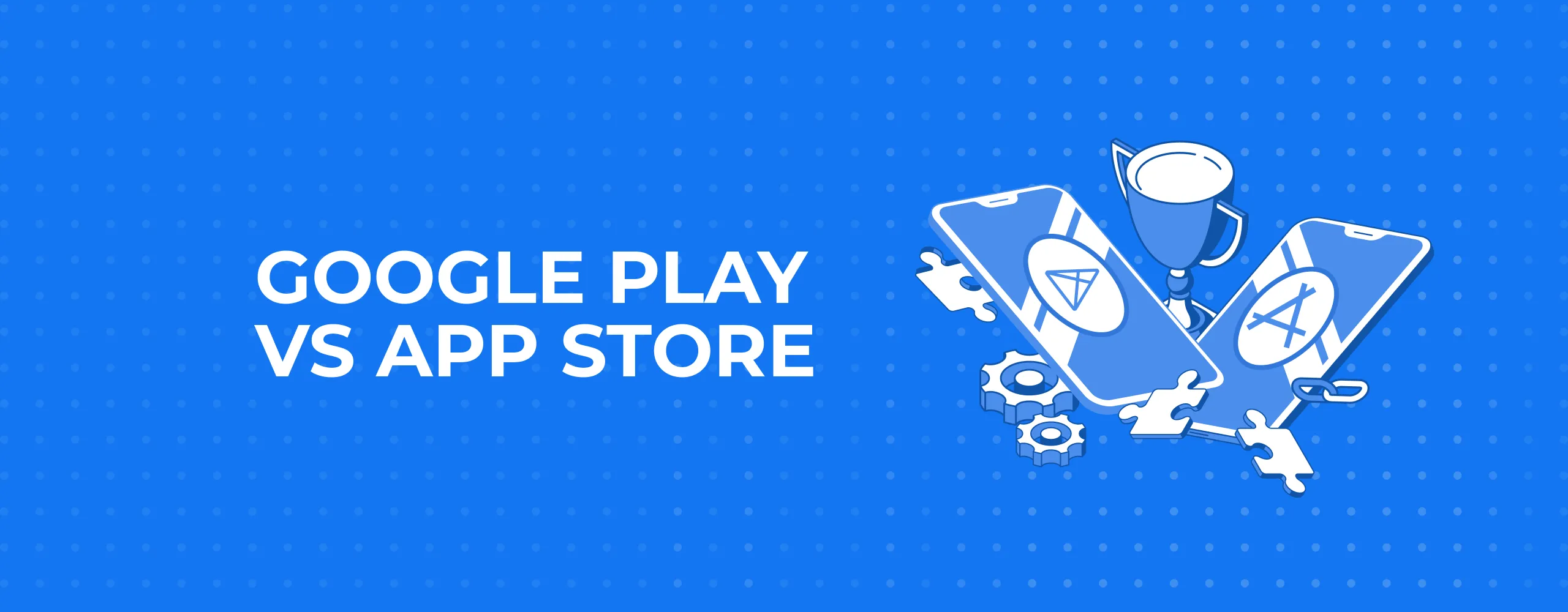
Google Play Vs App Store

Find out the main differences between the two most important application markets: Google Play and App Store. Both are responsible for hosting the vast majority of applications that users have installed on their devices. But where should you invest to make profit? Read this post to make a meaningful decision.
iOS
Apple created the first truly innovative mobile operating system after the introduction of the first iPhone in 2007.
The iPhone stands out for offering a unified user experience and completely innovative designs, different from those of other operating systems. It is for this reason, because of its design and simplicity, that iOS has become the preferred operating system for many users around the world.
Some of the main advantages of the App Store applications are as follows:
- The applications of IOS are compatible with all Apple devices. This means that you download the application once, you can enjoy it through all other devices.
- iOS users are more willing to purchase applications and content.
- Solid security protocols in the App Store .
- The top earning countries for Apple are the US, the UK, Japan, China, and Australia.
It is a closed operating system, i.e. only Apple products can use it.
Android
Android Inc. was purchased by Google in 2005. It is focused on mobile devices and tablets of all kinds.
Just as iOS has its own app store, App Store, Android also has its own market called Google Play.
The benefits of Android:
- Free operating system: Unlike iOS , Android is suitable for any technology company that wants, for this reason there are a variety of devices with this operating system.
- Cheaper applications.
- It is possible to download third-party or non-Google applications.
- Users are more reluctant to spend money on applications.
- The countries that generate the most revenue for Android are the USA, the United Kingdom, South Korea, Germany and Japan.
Differences
After analyzing each operating system separately we must show the main differences between them:
While iOS is a closed operating system, Android is open, so it can be installed on multitude of different devices. This makes the majority of devices sold in the world have an Android operating system, which also causes the number of applications downloads to be greater in Google Play.
- However, while Android is a leader in number of devices and downloads, iOS generates many more revenue, contract generated 80% more revenue last year.
This is due to several reasons:
The cost of App Store applications are much higher and users are not reluctant to pay them.
On Android, it is possible to install applications obtained outside of Google Play, which can negatively influence revenue.
Therefore, although in the future it is anticipated that these differences will be reduced by the improvements that Android introduces in its operating system, at the moment iOS is the market of applications that generates more revenue at a worldwide level.
As for the most downloaded applications, the sections that are growing the most are games and photography, not forgetting musical applications, lifestyle and entertainment. Therefore, games continue to be the most beneficial to both companies.
Comparison of App Stores for Developers: Google Play vs Apple App Store
Both Apple and Google allow developers to create applications, although the development process is different in many ways, from initial cost, programming language to discovery and monetization. Both platforms have their own advantages and disadvantages, so it is important to examine both stores before launching yourself into development. Below I will place the most notable differences between the Apple App Store and Google Play, which you may want to consider before choosing a platform.
- Development
Application development on Android is technically more difficult due to its fragmentation of multiple versions that run on consumer devices and multiple screen sizes. While the Android development language is Java, for iOS you need to know Objective-C or Swift.
- Members
Becoming an Android developer costs a flat rate of $25, while iOS developers must pay $ 99 each year.
- App Name
While Google allows 30 characters in the app name, Apple allows 255 characters so there is a little freedom to add additional keywords. Research has shown that adding keywords in the app name has a significant effect on ranking in both app stores. In the Apple App Store you can not change the title of your application, unless you submit an updated version. This makes A/B testing of the title more difficult, compared to Google Play where you can change the title at any time.
- Keywords
While the App Store offers a section to add keywords, in Google Play you have to include the keywords in the description and keywords of your app's ad, one after another is prohibited. Itunes allows a maximum of 100 characters for keywords, so be sure to add the best keywords. In the Apple App Store, the description has no impact in terms of App Store optimization.
- Shipping process
The Apple App Store consists of more quality applications. The reason behind this is the time to submit your app to the App Store, the Apple guys download and review it before posting. This prevents illegal and malicious content from entering the store. This is the biggest problem for developers, as applications are rejected by minor errors, and the review process can last up to 2 weeks. On Google Play, once you submit your app, it's available in about 2 hours.
- Monetization
However there is a significant difference in membership fees that looks like Apple monetizes better applications and offer possibilities for developers to make more money than they could in the Play Store. According to research, iOS users download more apps and more paid apps than Android users. If you are building to generate income directly then iOS is your friend. Developers get 70% of an app sales, both in app stores.
- App Ranking
Google Play takes into account external links (social media, press releases, blogs) in terms of search rankings. In Apple's store, these links do not affect the ranking of your application in search results. Google's search platform works best when it comes to misspellings. However, iTunes also records popular spelling errors for you (for example, "noises" records "Moses" as well). The discovery algorithm is a secret on both sides so developers can not play with the system, ensuring that they get the best results. The algorithm is changed from time to time by Apple and Google, which usually has a large effect on the ranking of applications that do not rank for the top 10-20 positions. In the Apple App Store, your application - once it was reviewed and published - has a greater chance of reaching the top of the lists than on Google Play.
Difference for Users (independent opinion)
Conclusion
These are pros and cons of creating your app for iOS or Android. In short, our marketers and developers’ recommendation is to first concentrate on your main target audience to cover the most valuable demand. And to reach the whole market you need to create both: an app for iOS and Android users.





